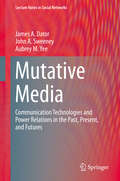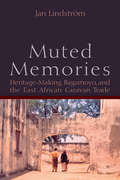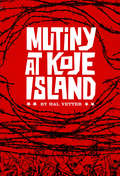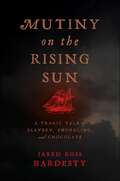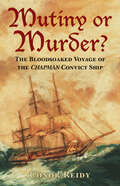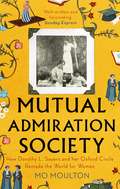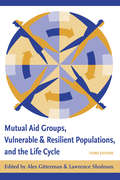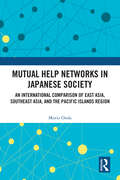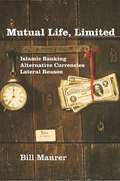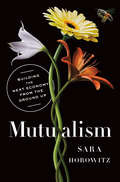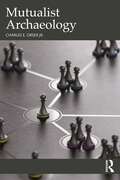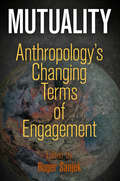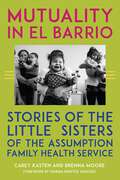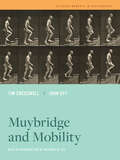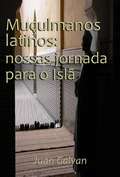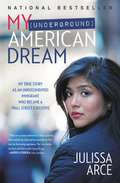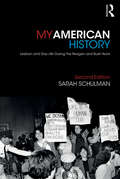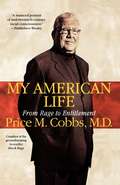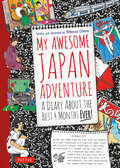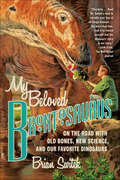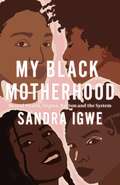- Table View
- List View
Mutative Media
by James A. Dator John A. Sweeney Aubrey M. YeeMutative Media is a sweeping examination of how communication technologies have contributed to changes in people's thoughts and actions, and thus in the power structures of societies, in the past, at present, and in four alternative futures. We start by surveying what is generally known about the emergence of human language and speech that has enabled humans to extend their organizing abilities beyond that of other hominids. We then review research on the emergence of signs, symbols, and eventually writing, which led to new ways of thinking, acting, and organizing in scribal societies and vastly extended human influence globally. We consider the impact of the printing press in Europe, the Middle East, China, and Korea that led to various ways of thinking and organizing in modern societies, and conclude our historical survey with a discussion of the emergence and impact of electric and electronic communication technologies from the nineteenth century to the present. After a brief overview of what "futures studies" is and is not, based on our extensive experience in the field, we present four generic alternative futures, and discuss a prototype of a hybrid, mixed-reality game designed to enable players to experience the power and potential of new communication technologies within four very different environments and conditions. We think you will be intrigued by our surprising findings and what they may mean for future generations!
Muted Memories: Heritage-Making, Bagamoyo, and the East African Caravan Trade
by Jan LindströmIn the late nineteenth century, tens of thousands of porters carried ivory every year from the African interior to Bagamoyo, a port town at the Indian Ocean. In the opposite direction, they carried millions of meters of cloth, manufactured in the USA, Europe, and India. This book examines the centrality of the caravan trade, both culturally and economically, to Bagamoyo’s development and cosmopolitan character, while also exploring how this history was silenced when Bagamoyo was instead branded as a slave route town in 2006 in an attempt to qualify it for the UNESCO World Heritage List.
Mutiny at Koje Island
by Hal VetterThis absolutely authentic, horrifying account of treachery, intrigue and ruthless brutality among 150,000 Communist POWs herded together on the small rugged island of Koje-do in Korea, tells of their holding the American commander as hostage and of their ultimate vicious mutiny, armed with thousands of improvised spears, gasoline grenades, and knives, and with countless barbed-wire flails.This is a now-it-can-be-told book that no American can read without becoming shocked and fighting mad. On the other hand no American can read the transcripts of the proceedings at Panmunjom without a deep feeling of respect and admiration for the distinguished military leaders of the United Nations to whom our national honor was entrusted. Their dignity, patience, and forbearance in the performance of a bleak, unrewarding task deserve the commendation of each and every citizen of the free world community.
Mutiny on the Rising Sun: A Tragic Tale of Slavery, Smuggling, and Chocolate
by Jared Ross HardestyA little-known story of mutiny and murder illustrating the centrality of smuggling and slavery in early American societyOn the night of June 1, 1743, terror struck the schooner Rising Sun. After completing a routine smuggling voyage where the crew sold enslaved Africans in exchange for chocolate, sugar, and coffee in the Dutch colony of Suriname, the ship traveled eastward along the South American coast. Believing there was an opportunity to steal the lucrative cargo and make a new life for themselves, three sailors snuck below deck, murdered four people, and seized control of the vessel.Mutiny on the Rising Sun recounts the origins, events, and eventual fate of the Rising Sun’s final smuggling voyage in vivid detail. Starting from that horrible night in June 1743, it narrates a deeply human history of smuggling, providing an incredible story of those caught in the webs spun by illicit commerce. The case generated a rich documentary record that illuminates an international chocolate smuggling ring, the lives of the crew and mutineers, and the harrowing experience of the enslaved people trafficked by the Rising Sun. Smuggling stood at the center of the lives of everyone involved with the business of the schooner. Larger forces, such as imperial trade restrictions, created the conditions for smuggling, but individual actors, often driven by raw ambition and with little regard for the consequences of their actions, designed, refined, and perpetuated this illicit commerce. At once startling and captivating, Mutiny on the Rising Sun shows how illegal trade created demand for exotic products like chocolate, and how slavery and smuggling were integral to the development of American capitalism.
Mutiny or Murder?: The Bloodsoaked Voyage of the Chapman Convict Ship
by Conor ReidyOn 15 March 1817 the convict ship the Chapman departed from Cork with 200 male prisoners on board. When it dropped anchor off Sydney Cove four months later, its prison doors opened to reveal 160 gaunt and brutalised men. Twelve were dead and twenty-eight lay wounded in the hospital below deck. As officials pieced together the horrors of the voyage many questions arose. Why did Michael Collins claim that his fellow convicts conspired to take the ship? Why was Captain Drake unable to rein in the violent and sadistic Third Mate Baxter? Was there really an attempted mutiny on the Chapman? Or was this cold-blooded murder? Using daily journals from the crew, detailed testimony from several convicts and official colonial government correspondence, this book unravels what happened during those four months at sea. Tarnished by intrigue, suspicion and mutual hatred, this is the story of one of the darkest episodes in the history of penal transportation between Ireland and Australia.
Mutual Admiration Society: How Dorothy L. Sayers and Her Oxford Circle Remade the World For Women
by Mo Moulton'An enjoyable anthem to friendship' Hephzibah Anderson, Observer'Hugely enjoyable . . . Modern-day readers can thank the ambitious, complicated, funny, brave women of the Mutual Admiration Society' Anna Carey, Sunday Business Post'A tribute to that precious but still unsung thing: the loving bond between female friends, based on intellectual exchange and deep affection' Charlotte Higgins, Guardian Winner of the Agatha Award for best nonfiction 2020Dorothy L. Sayers is now famous for her Lord Peter Wimsey and Harriet Vane detective series, but she was equally well known during her life for an essay asking 'Are Women Human?' Women's rights were expanding rapidly during Sayers's lifetime; she and her friends were some of the first women to receive degrees from Oxford. Yet, as historian Mo Moulton reveals, it was clear from the many professional and personal obstacles they faced that society was not ready to concede that women were indeed fully human. Dubbing themselves the Mutual Admiration Society, Sayers and her classmates remained lifelong friends and collaborators as they fought for a truly democratic culture that acknowledged their equal humanity. A celebration of feminism and female friendship, Mutual Admiration Society offers crucial insight into Dorothy L. Sayers and her world.
Mutual Aid Groups, Vulnerable and Resilient Populations, and the Life Cycle
by Alex Gitterman Lawrence SchulmanThe contributors to this volume examine the role of mutual aid groups and social workers in helping members of oppressed, vulnerable, and resilient populations regain control over their lives. The chapters reveal the ways in which mutual aid processes help individuals overcome social and emotional trauma in contemporary society by reducing isolation, universalizing individual problems, and mitigating stigma. Using the life cycle as a framework the editors establish a theoretical model for practice and demonstrate how social workers as group leaders can foster the healing and empowering process of mutual aid. The contributors also consider the fundamentals of the mutual aid process, the institutional benefits of group service, and specific clinical examples of mutual aid groups. Each chapter offers detailed case materials that illustrate both group work skills and developmental issues for a variety of populations and settings, including HIV-positive and AIDS patients, the homeless, and perpetrators and victims of sexual abuse and family violence. New chapters in this completely revised and updated third edition illustrate the power of mutual aid processes in dealing with children traumatized by the events of September 11, adult survivors of sexual abuse, parents with developmentally challenged children, people with AIDS in substance recovery, and mentally ill older adults.
Mutual Help Networks in Japanese Society: An International Comparison of East Asia, Southeast Asia, and the Pacific Islands Region
by Morio OndaOnda compares Japan’s traditional mutual help practices, an integral part of the nation’s societal fabric, with those of other countries across Asia, including Korea, China, Taiwan, the Philippines, Indonesia, Thailand, Malaysia, and Vietnam, and the Pacific islands region, namely Palau and Pohnpei.The book advocates for the revitalization of mutual help, which has declined due to modernization, characterized by changes in production and our urban lifestyle. It sheds light on the fading awareness of traditional mutual help practices and encourages the discovery of new connections and bonds in contemporary society. Onda’s comparative approach reveals the characteristics of mutual help networks based on the similarities (universality) with and differences (uniqueness) from Japan’s mutual help practices, which stem from the social structures of individual regions.A vital resource for scholars in sociology, folklore studies, social welfare, or economics and those interested in human connections, mutual help, and cooperation.
Mutual Life, Limited: Islamic Banking, Alternative Currencies, Lateral Reason
by Bill MaurerWhy are people continually surprised to discover that money is "just" meaning? Mutual Life, Limited spends time among those who, in acknowledging the fictions of finance, are making money anew. It documents ongoing efforts to remake money and finance by Islamic bankers who seek to avoid interest and local currency proponents who would stand outside of national economies. It asks how alternative moneys both escape and reenact dominant forms of money and finance, and reflects critically on their broader implications for scholarship. Based on fieldwork among participants in a local currency system in Ithaca, New York, and among Islamic banking practitioners in the United States, Indonesia, and elsewhere, this book exploits the convergence between the reflexivity of monetary alternatives and social inquiry by questioning the equivalence between money and ethnography. Can money ever be adequate to the value backing it? Can social description ever be adequate to messy and contingent realities? Bill Maurer's ethnographic discovery is that ethnography as such--the holistic description of a way of life--cannot be sustained when faced with a set of practices that anticipates and incorporates it in advance. His fluently written book represents an unprecedented critique of social scientific approaches to money through an ethnographic description of specific monetary alternatives, while also speaking broadly to the very problem of anthropological knowledge in the twenty-first century.
Mutualism: Building the Next Economy from the Ground Up
by Sara HorowitzA profound look at the crisis of work and the collapse of the safety net, and a vision for a better way forward, rooted in America&’s cooperative spirit, from the founder of the Freelancers Union &“Read this essential book to see how we can and must build the future.&”—Reid Hoffman, co-founder of Linkedin Mutualism: It&’s not capitalism and it&’s not socialism. It&’s the future. The twentieth century changed every facet of life for American workers: how much they could expect to earn and what they had the right to demand. But by 2027, a majority of Americans—from low-wage service workers to white-collar professionals—won&’t be traditional employees. Benefits like paid sick leave, pensions, 401(k)s, disability insurance, and health care will be nearly extinct. To meet the needs of this new generation of workers, the government has done almost nothing. In this book, labor lawyer, former chair of the board of the New York Federal Reserve, and MacArthur &“genius&” Sara Horowitz brings us a solution to the current crisis of work that&’s rooted in the best of American traditions, which she calls mutualism. Horowitz shows how the future of our economic safety net rests on this approach and demonstrates how mutualist organizations have helped us solve common problems in the past and are now quietly driving rural and urban economies alike all over the world, inspired not by for-profit corporations but by labor unions and trade associations, religious organizations and mutual aid societies, and vital social movements from women&’s suffrage to civil rights. Mutualism is for anyone who feels that the system is not working for them, and is looking for a new way to build collaboratively, create the new American social contract, and prosper in the twenty-first century.
Mutualist Archaeology
by Charles E. Orser Jr.Mutualist Archaeology proposes that the theory of mutualism can transform archaeology from what someconsider to be a discipline in crisis.This book argues that the methodological and practical applications of mutualism can transform both the practice of archaeology and the way that interpretations of the past are created. Nineteenth-century theories of capitalism and Darwinism led many to assume that competition, both in the present and the past, was the most natural process in the world. Despite the tenacity of the competitive argument, this book highlights another way of seeing the natural and human world, beneficial association, or mutualism. Chapters set out how mutualist theory can offer differing perspectives on the many historical contexts archaeologists investigate, such as exchange and social complexity, as well as how archaeologists work together. Until now, no archaeologist has explicitly explored the richness that exists within mutualism, and in addition to providing a useful research perspective, mutualist theory also has profound implications for the practice of contemporary archaeology, including the drive to decolonize archaeological practice.Introducing mutualist theory and its significance for archaeological research, this book is for researchers and students of archaeological theory and archaeologists looking for new ways to view the discipline.
Mutuality
by Roger SanjekWhy do people do social-cultural anthropology? Beyond professional career motivations, what values underpin anthropologists' commitments to lengthy training, fieldwork, writing, and publication? Mutuality explores the values that anthropologists bring from their wider social worlds, including the value placed on relationships with the people they study, work with, write about and for, and communicate with more broadly.In this volume, seventeen distinguished anthropologists draw on personal and professional histories to describe avenues to mutuality through collaborative fieldwork, community-based projects and consultations, advocacy, and museum exhibits, including the American Anthropological Association's largest public outreach ever--the RACE: Are We So Different? project. Looking critically at obstacles to reciprocally beneficial engagement, the contributors trace the discipline's past and current relations with Native Americans, indigenous peoples exhibited in early twentieth-century world's fairs, and racialized populations. The chapters range widely--across the Punjabi craft caste, Filipino Igorot, and Somali Bantu global diasporas; to the Darfur crisis and conciliation efforts in Sudan and Qatar; to applied work in Panama, Micronesia, China, and Peru. In the United States, contributors discuss their work as academic, practicing, and public anthropologists in such diverse contexts as Alaskan Yup'ik communities, multiethnic New Mexico, San Francisco's Japan Town, Oakland's Intertribal Friendship House, Southern California's produce markets, a children's ward in a Los Angeles hospital, a New England nursing home, and Washington D.C.'s National Mall. Deeply personal as well as professionally astute, Mutuality sheds new light on the issues closest to the present and future of contemporary anthropology.Contributors: Rogaia Mustafa Abusharaf, Robert R. Alvarez, Garrick Bailey, Catherine Besteman, Parminder Bhachu, Ann Fienup-Riordan, Zibin Guo, Lane Ryo Hirabayashi, Lanita Jacobs, Susan Lobo, Yolanda T. Moses, Sylvia Rodríguez, Roger Sanjek, Renée R. Shield, Alaka Wali, Deana L. Weibel, Brett Williams.
Mutuality in El Barrio: Stories of the Little Sisters of the Assumption Family Health Service
by Brenna Moore Carey KastenThe stories of 18 immigrant families from East Harlem and their experiences with one of New York’s deeply-rooted organizationsOn any given weekday, people stream in and out of Little Sisters of the Assumption Family Health Service’s bright, airy building on 115th Street. They are mostly mothers who find their way to LSA, sometimes only weeks after crossing the border from Mexico, having heard of the support that las hermanitas (“the little sisters”) offer. Opening a window into the world of New York’s Spanish-speaking newcomers, Mutuality in El Barrio combines oral histories with archival research of the history, spirituality, and ministry of LSA to present how this well-established organization serves vulnerable populations with a unique approach they call “mutuality.”LSA is part of a network of East Harlem’s powerful grassroots organizations that draws from the remarkable strengths of local families in its community. It is a place of healing and empowerment focused on the overall holistic health of resident families. Long-term relationships are cultivated here rather than quick fixes, and it is a place that nurtures people’s full potential as leaders, parents, and advocates for themselves. In Mutuality in El Barrio, eighteen mothers share how, through the help of LSA, they managed to navigate a strange city and an unfamiliar language in a neighborhood that has long been a site of incredible challenges and extraordinary strength, creativity, and cultural vitality.These personal accounts of mothers, long-time LSA staff, and nuns reveal how these women found solidarity, accompaniment, care, neighborhood transformation, and binding connections through mutuality that helped them grow and connect in East Harlem. Their stories shine a light on an organization that began as a small community of vowed nuns who, like these mothers, also trace their origins abroad.
Muybridge and Mobility (Defining Moments in Photography #6)
by Tim Cresswell John OttA cultural geographer and an art historian offer fresh interpretations of Muybridge’s famous motion studies through the lenses of mobility and race. In 1878, Eadweard Muybridge successfully photographed horses in motion, proving that all four hooves leave the ground at once for a split second during full gallop. This was the beginning of Muybridge’s decades-long investigation into instantaneous photography, culminating in his masterpiece Animal Locomotion. Muybridge became one of the most influential photographers of his time, and his stop-motion technique helped pave the way for the motion-picture industry, born a short decade later. Coauthored by cultural geographer Tim Cresswell and art historian John Ott, this book reexamines the motion studies as historical forms of "mobility," in which specific forms of motion are given extraordinary significance and accrued value. Through a lively, interdisciplinary exchange, the authors explore how mobility is contextualized within the transformations of movement that marked the nineteenth century and how mobility represents the possibilities of social movement for African Americans. Together, these complementary essays look to Muybridge’s works as interventions in knowledge and experience and as opportunities to investigate larger social ramifications and possibilities.
Muçulmanos latinos: nossas jornadas para o Islã
by Juan Galvan"Muçulmanos latinos: nossas jornadas para o Islã" é uma coleção de histórias sobre a jornada particular de cada uma das pessoas participantes para a verdade. Esse livro trata das dificuldades, descobertas e revelações durante essa jornada e sobre encontrar, por fim, a paz no Islã. Elogiado por Michael Wolfe, autor de The Hadj: An American’s Pilgrimage to Mecca... “Esse é um livro que encherá seus ouvidos com o coro de vozes que talvez você nunca tenha ouvido tão claramente. O que eu gosto nesta grande coleção cuidadosamente apresentada de dissertativas testemunhantes é a sua variedade, inquietude, abertura e amplitude. Por um lado, os leitores conhecerão um pouco sobre o Islã e sua história será uma surpresa pela ideia de convertidos de raízes hispânicas ao Islã. Eles devem se preparar para alguns lembretes: que o idioma espanhol está cheio de palavras árabes, que a semelhança arquitetônica entre o México e o Oriente Médio não é acidental, que a Espanha, a pérola social, cultural e intelectual da Europa Medieval esteve cheia de muçulmanos de Meca, Damasco e Marrocos por pelo menos oito séculos, que um grande número de católicos romanos e pessoas seculares que agora vivem na Espanha e suas ex-colônias remotas do novo mundo, pode, se quiser, rastrear suas linhagens até as famílias islâmicas de séculos atrás, e que Jesus sempre teve um papel essencial na teologia islâmica e na vida dos muçulmanos. Por outro lado, os muçulmanos que têm todas essas informações também podem se surpreender com o livro de Juan Galvan porque as vozes aqui são particularmente claras ou não suavizam os aspectos problemáticos ao assumir uma nova religião por escolha. Nossas jornadas é uma coleção de vozes humanas atuais e vivas que revelam a beleza da descoberta, mas que também lutam fisicamente com o estresse e pressões de uma decisão que pode facilmente confundir vizinhos e mesmo, talvez pri
My (Underground) American Dream: My True Story as an Undocumented Immigrant Who Became a Wall Street Executive
by Julissa ArceWhat does an undocumented immigrant look like? What kind of family must she come from? How could she get into this country? What is the true price she must pay to remain in the United States? JULISSA ARCE knows firsthand that the most common, preconceived answers to those questions are sometimes far too simple-and often just plain wrong. On the surface, Arce's story reads like a how-to manual for achieving the American dream: growing up in an apartment on the outskirts of San Antonio, she worked tirelessly, achieved academic excellence, and landed a coveted job on Wall Street, complete with a six-figure salary. The level of professional and financial success that she achieved was the very definition of the American dream. But in this brave new memoir, Arce digs deep to reveal the physical, financial, and emotional costs of the stunning secret that she, like many other high-achieving, successful individuals in the United States, had been forced to keep not only from her bosses, but even from her closest friends. From the time she was brought to this country by her hardworking parents as a child, Arce-the scholarship winner, the honors college graduate, the young woman who climbed the ladder to become a vice president at Goldman Sachs-had secretly lived as an undocumented immigrant. In this surprising, at times heart-wrenching, but always inspirational personal story of struggle, grief, and ultimate redemption, Arce takes readers deep into the little-understood world of a generation of undocumented immigrants in the United States today- people who live next door, sit in your classrooms, work in the same office, and may very well be your boss. By opening up about the story of her successes, her heartbreaks, and her long-fought journey to emerge from the shadows and become an American citizen, Arce shows us the true cost of achieving the American dream-from the perspective of a woman who had to scale unseen and unimaginable walls to get there.
My Account: The official autobiography
by Coleen RooneyYou may think you know everything about the seemingly dazzling life of Coleen Rooney.From growing up in Liverpool, where she met her childhood sweetheart Wayne, her career as a successful columnist to raising a family, every detail of her life has been widely reported on. Now in her own words, Coleen reveals the reality of living under such intense public scrutiny and how it has affected her life as a wife, mother and friend.Most notably she reveals her deepest thoughts and feelings about an infamous tale of friendship and betrayal played out on the national stage.
My American History: Lesbian and Gay Life During the Reagan and Bush Years (Women On Women Ser.)
by Sarah SchulmanSarah Schulman’s writing is bold, provocative, and refreshingly unrepentant. First published in 1994, My American History: Lesbian and Gay Life During the Reagan and Bush Years combines critical commentary with a rich and varied collection of news articles, letters, interviews, and reports in which the author traces the development of lesbian and gay politics in the U.S. In her coverage of many tireless campaigns of activism and resistance, Sarah Schulman documents a powerful political history that most people – gay or straight – never knew happened. In her Preface to this second edition, Urvashi Vaid argues for the continued relevance of Schulman’s writing to activism in the 21st century, particularly in light of the resurgence of the right in American politics. Also included is a selection of articles by Sarah Schulman for Womanews, in their original print format, with illustrations by Alison Bechdel. The book closes with an interview with the author, conducted by Steven Thrasher, especially for this new edition. It explores AIDS and homophobia during the Reagan/Bush administrations and at the dawn of the Trump era. My American History is a collection that gives voice to both the personal and political struggles of feminist and lesbian and gay communities in the 1980s. It is an important historical record that will enlighten and inform activists, as well as academics of women’s, gender and sexuality studies, in the 21st century.
My American Life: From Rage to Entitlement
by Price M. CobbsPrice M. Cobbs, M.D., coauthor, with William H. Grier, of Black Rage-- one of the twentieth century's most profound examinations of black life in America -- has been a witness to some of the most important events in American history. Now, thirty years later, for the first time he reconsiders his extraordinary life and career, offering a moving account of his journey -- as one of the nation's foremost authorities in the field of psychiatry -- from rage to entitlement. An African American pioneer in the field of psychiatry, Dr. Cobbs in his lifetime has grown up during the Great Depression, felt the dramatic effects of World War II, and witnessed the dismantling of Jim Crow laws and the impact of Brown vs. Board of Education. He watched the rise of Martin Luther King Jr. and the heroism of Rosa Parks in the civil rights movement. He followed the life of Malcolm X and "searched avidly for what animated the ideas beneath his fiery rhetoric." Every experience of his early life and education led to an auspicious partnership with a colleague, William H. Grier, who shared his convictions and the work involved in producing what the New York Times would call "one of the most important books on [blacks]." Written at the height of the black power movement, Black Rage has sold over one million copies and remains a relevant study of race relations. Dr. Cobbs has lived through decades of profound social, political, and cultural transformation in America. A second-generation doctor, Cobbs has at once written a classic portrait of an amazing family and the making of a healer and community and business leader. As a psychiatrist, he has pioneered methods for studying the psychology of race and gender. So, while My American Life is a heartfelt memoir of a loving father and husband, it is also a chronicle of the black experience in America.
My Army Life and the Fort Phil. Kearney Massacre: The Classic Account of an Infantry Lieutenant's Wife on the Great Plains During the Indian Wars
by Frances C Carrington"My Army Life and the Fort Phil. Kearney Massacre" by Frances C. Carrington is a poignant and gripping firsthand account of life on the American frontier during one of its most tumultuous periods. Carrington, the wife of Lieutenant Colonel Henry B. Carrington, offers a vivid and personal narrative of her experiences living at Fort Phil Kearny, a remote outpost in Wyoming during the mid-19th century.Through her detailed and evocative writing, Carrington provides an intimate glimpse into the daily challenges, hardships, and triumphs faced by military families stationed in the western territories. She describes the rugged beauty of the frontier, the constant threat of attack from hostile forces, and the camaraderie among the soldiers and their families. Her observations are enriched by her unique perspective as a woman in a predominantly male environment, offering valuable insights into the social dynamics and domestic life at the fort.The centerpiece of Carrington's memoir is her harrowing account of the Fort Phil Kearny Massacre, also known as the Fetterman Massacre, which occurred on December 21, 1866. She recounts the events leading up to the tragic conflict between the U.S. Army and the Lakota, Cheyenne, and Arapaho warriors, resulting in the loss of 81 soldiers and civilians, including her husband's close colleagues. Carrington's personal connection to the events and her emotional narrative bring a profound depth to this historical episode."My Army Life and the Fort Phil. Kearney Massacre" is not only a compelling historical document but also a testament to the resilience and strength of those who lived through the trials of frontier life. Frances C. Carrington's memoir offers a unique and valuable perspective on a significant chapter of American history, making it an essential read for historians, enthusiasts of the Old West, and anyone interested in the human stories behind historical events.This book stands as a poignant reminder of the sacrifices and struggles of military families and the enduring impact of historical events on individual lives.
My Awesome Japan Adventure
by Rebecca OtowaPICKED AS ONE OF THE BEST BOOKS OF 2013 BY THE ASSOCIATION OF BOOKSELLERS FOR CHILDREN! A perfect introduction to Japanese culture for kids, My Awesome Japan Adventure is the diary of an American fifth grader who travels to Japan to spend four exciting months with a Japanese family as an exchange student. He records all his adventures in this diary so that he can tell his friends back home about what he did and saw during his time in Japan. With the help of a Japanese foster brother and sister he visits a Ninja village, tries new foods, learns brush painting, and gets the inside scoop on daily life in a Japanese school. Readers of all ages will love experiencing life in Japan from a kid's point of view! Dan's adventures include: My First Week of School, Visiting a Ninja Village, Fun with Origami, Practicing Aikido, Making Mochi, and much more...
My Awesome Japan Adventure
by Rebecca OtowaPICKED AS ONE OF THE BEST BOOKS OF 2013 BY THE ASSOCIATION OF BOOKSELLERS FOR CHILDREN!<P> A perfect introduction to Japanese culture for kids, My Awesome Japan Adventure is the diary of an American fifth grader who travels to Japan to spend four exciting months with a Japanese family as an exchange student. He records all his adventures in this diary so that he can tell his friends back home about what he did and saw during his time in Japan. With the help of a Japanese foster brother and sister he visits a Ninja village, tries new foods, learns brush painting, and gets the inside scoop on daily life in a Japanese school. Readers of all ages will love experiencing life in Japan from a kid's point of view!<P> Dan's adventures include: My First Week of School, Visiting a Ninja Village, Fun with Origami, Practicing Aikido, Making Mochi, and much more...<P> Advisory: Bookshare has learned that this book offers only partial accessibility. We have kept it in the collection because it is useful for some of our members. To explore further access options with us, please contact us through the Book Quality link on the right sidebar. Benetech is actively working on projects to improve accessibility issues such as these.
My Beloved Brontosaurus: On the Road with Old Bones, New Science, and Our Favorite Dinosaurs
by Brian SwitekA Hudson Booksellers Staff Pick for the Best Books of 2013One of Publishers Weekly's Top Ten Spring Science BooksA Bookshop Santa Cruz Staff PickDinosaurs, with their awe-inspiring size, terrifying claws and teeth, and otherworldly abilities, occupy a sacred place in our childhoods. They loom over museum halls, thunder through movies, and are a fundamental part of our collective imagination. In My Beloved Brontosaurus, the dinosaur fanatic Brian Switek enriches the childlike sense of wonder these amazing creatures instill in us. Investigating the latest discoveries in paleontology, he breathes new life into old bones.Switek reunites us with these mysterious creatures as he visits desolate excavation sites and hallowed museum vaults, exploring everything from the sex life of Apatosaurus and T. rex's feather-laden body to just why dinosaurs vanished. (And of course, on his journey, he celebrates the book's titular hero, "Brontosaurus"—who suffered a second extinction when we learned he never existed at all—as a symbol of scientific progress.)With infectious enthusiasm, Switek questions what we've long held to be true about these beasts, weaving in stories from his obsession with dinosaurs, which started when he was just knee-high to a Stegosaurus. Endearing, surprising, and essential to our understanding of our own evolution and our place on Earth, My Beloved Brontosaurus is a book that dinosaur fans and anyone interested in scientific progress will cherish for years to come.
My Black Motherhood: Mental Health, Stigma, Racism and the System
by Sandra IgweJoyful. Graceful. Blessed. Strong. Anxious. Depressed. Stigmatised. Stereotyped. What happens when motherhood isn't what you expected - and when you reach out for support, you are met with judgment and prejudice? Sandra Igwe shares her journey as a young Black mother, coping with sleepless nights, anxiety and loneliness after the birth of her first daughter. Burdened by cultural expectations of the 'good mother' and the 'strong Black woman' trope, her mental health struggles became an uphill battle. Black women are at higher risk of developing postnatal depression but are the least likely to be identified as depressed. Sharing the voices of other mothers, Sandra examines how culture, racism, stigma and a lack of trust in services prevent women getting the help they need. Breaking open the conversation on motherhood, race, and mental health, she demands that Black women are listened to, believed, and understood.
